
a glimpse of indian spirituality pdf
The PDF document “A Glimpse of Indian Spirituality” is an essential resource‚ blending ancient wisdom with contemporary insights. It addresses the modern world’s fast-paced challenges‚ offering a pathway to inner peace and purpose.
Overview of the PDF Document
The PDF document‚ “A Glimpse of Indian Spirituality‚” serves as a comprehensive guide to understanding India’s spiritual legacy. It explores the rich tapestry of Indian spirituality‚ blending ancient texts‚ philosophical frameworks‚ and contemporary interpretations. The document delves into key traditions such as Bhakti and Sufism‚ highlighting their evolution and impact on spiritual thought. It also examines the psychological and cultural dimensions of spirituality‚ offering insights into how these practices foster inner peace and purpose in modern life. Featuring contributions from renowned figures like Swami Vivekananda and Sai Baba of Shirdi‚ the PDF provides a curated selection of teachings and texts. This resource bridges the gap between traditional wisdom and modern relevance‚ making it invaluable for those seeking to explore India’s spiritual heritage in depth.
Historical Context of Indian Spirituality
Indian spirituality is deeply rooted in a rich historical legacy that spans thousands of years. The Vedic period laid the foundation with its emphasis on rituals‚ philosophies‚ and the concept of dharma. Over centuries‚ this evolved into diverse traditions‚ including Hinduism‚ Buddhism‚ and Jainism‚ each contributing unique perspectives on the nature of existence and the path to liberation. The Upanishads and epics like the Bhagavad Gita further enriched this tapestry‚ offering profound insights into the human condition and the pursuit of enlightenment. The Bhakti movement‚ emerging around the medieval period‚ emphasized devotion as a powerful means to connect with the divine. Sufism‚ influenced by Islamic mysticism‚ also found resonance in India‚ blending with local traditions to create a syncretic spiritual culture. This historical journey reflects a continuous exploration of the divine‚ self-realization‚ and the integration of diverse philosophical and cultural influences.
Key Concepts in Indian Spiritual Thought
Indian spiritual thought revolves around timeless concepts that guide individuals toward self-realization and harmony. Central to this tradition is the idea of dharma‚ or righteous living‚ which emphasizes moral duty and ethical behavior. The concept of karma underscores the law of cause and effect‚ linking actions to their consequences across lifetimes. Moksha‚ or liberation from the cycle of rebirth‚ is the ultimate spiritual goal. The teachings also explore the nature of the Atman (individual self) and its relationship with Brahman (the universal consciousness). Additionally‚ principles like ahimsa (non-violence) and compassion are deeply ingrained‚ reflecting a holistic approach to life. These concepts collectively provide a moral‚ philosophical‚ and spiritual framework for attaining inner peace and understanding the universe. They remain highly relevant‚ offering practical wisdom for navigating modern life’s challenges while fostering a deeper connection to oneself and the world.
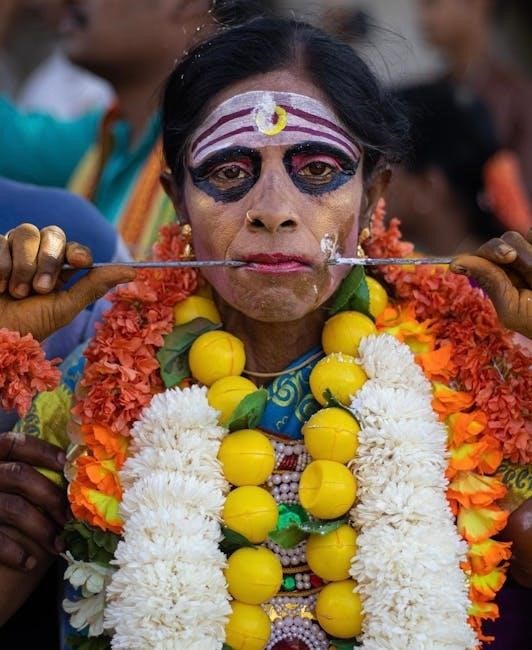
Foundations of Indian Spirituality
Indian spirituality’s foundations lie in the Vedas and Upanishads‚ offering philosophical insights and ethical guidelines. Yoga and meditation provide practical paths to spiritual growth and self-realization‚ fostering a balanced life and inner harmony.
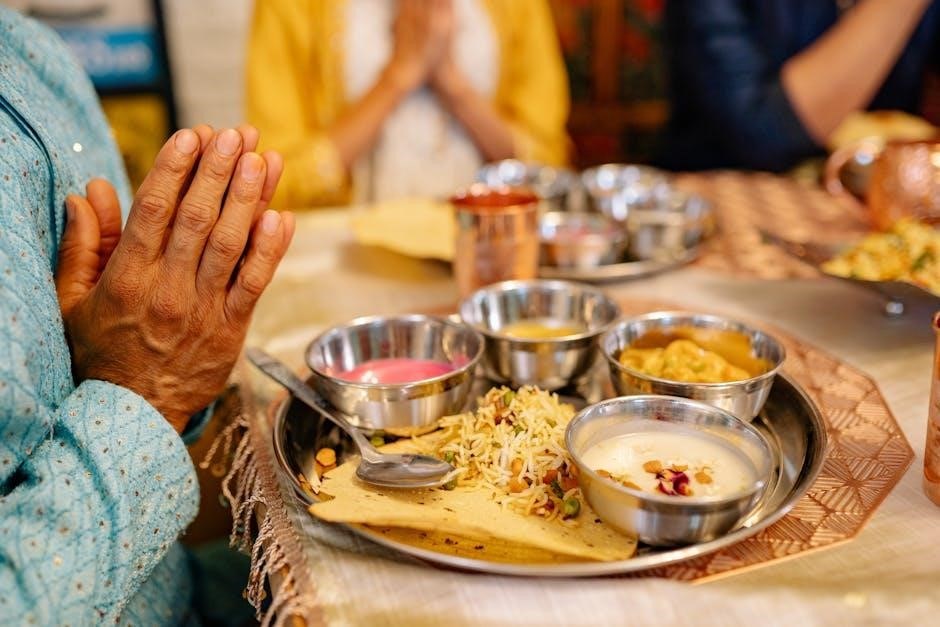
The Role of Vedas and Upanishads

The Vedas and Upanishads are the cornerstone of Indian spirituality‚ offering timeless wisdom and guiding principles for life. The Vedas‚ ancient texts‚ provide insights into rituals‚ duties (dharma)‚ and moral order (karma)‚ while the Upanishads delve into profound philosophical inquiries‚ exploring the nature of ultimate reality (Brahman) and the self (Atman). These scriptures emphasize the interconnectedness of all existence‚ advocating for a harmonious relationship between the individual and the universe. The Upanishads introduce concepts like the four stages of life (Ashramas) and the pursuit of liberation (Moksha). Together‚ they form a rich tapestry that has shaped India’s spiritual and cultural identity‚ influencing ethical living‚ self-realization‚ and the quest for inner peace.
Philosophical Framework of Vedanta
Vedanta‚ a cornerstone of Indian spirituality‚ is a philosophical tradition rooted in the Upanishads and the Brahmasutras. It explores the nature of ultimate reality (Brahman) and the individual self (Atman)‚ emphasizing their interconnectedness. Vedanta is divided into sub-schools like Advaita (non-dualism)‚ Dvaita (dualism)‚ and Vishishtadvaita (qualified non-dualism)‚ each offering unique perspectives on existence. The framework underscores the concept of Maya (illusion) and the liberation of the soul (Moksha) through self-realization. Vedanta’s teachings encourage introspection‚ self-inquiry‚ and the pursuit of wisdom‚ providing a profound understanding of life’s purpose and the path to spiritual fulfillment. Its universal appeal lies in addressing fundamental human questions about existence‚ consciousness‚ and the divine‚ making it a timeless guide for seekers of truth. Vedanta’s influence is deeply embedded in Indian culture and continues to inspire spiritual and philosophical discourse globally.

Yoga and Its Significance in Indian Spirituality
Yoga‚ a profound practice rooted in Indian spirituality‚ is a holistic approach to physical‚ mental‚ and spiritual well-being. It encompasses a wide range of techniques‚ including postures (Asanas)‚ breath control (Pranayama)‚ and meditation‚ aimed at unifying the body‚ mind‚ and spirit. Originating from ancient Vedic traditions‚ Yoga is deeply intertwined with the philosophy of Vedanta‚ emphasizing the pursuit of self-realization and liberation (Moksha). The Eightfold Path of Yoga‚ as outlined in Patanjali’s Yoga Sutras‚ provides a structured journey toward ethical living‚ self-discipline‚ and inner harmony. Yoga’s significance lies in its ability to transcend cultural and religious boundaries‚ offering universal principles for achieving balance and peace in daily life. It remains a cornerstone of Indian spirituality‚ inspiring millions worldwide to embrace a path of holistic living and spiritual growth.
Bhakti and Sufi Traditions
Bhakti and Sufi traditions converge in their emphasis on devotion‚ love‚ and spiritual unity. These practices bridge cultural divides‚ fostering harmony and enriching India’s spiritual tapestry.
Evolution of Bhakti Movement
The Bhakti movement emerged as a powerful devotional wave‚ emphasizing love and surrender to the divine. Originating in southern India‚ it spread across the subcontinent‚ transcending caste and gender barriers. Early figures like the Alvars and Nayanmars in the south‚ and later saints such as Kabir‚ Mirabai‚ and Chaitanya in the north‚ played pivotal roles. Their teachings stressed emotional connection to deities‚ often through music and poetry. The movement challenged rigid rituals‚ advocating for personal faith and inclusivity. Over time‚ it blended with Sufi traditions‚ creating a syncretic spiritual practice that resonated deeply with diverse communities. The Bhakti movement remains a cornerstone of Indian spirituality‚ fostering a sense of unity and emotional fulfillment. Its legacy endures‚ inspiring modern seekers to embrace heartfelt devotion as a path to inner peace and divine connection.
Sufi Influence on Indian Spirituality
Sufism‚ with its emphasis on love‚ mysticism‚ and inner purification‚ profoundly shaped Indian spirituality. Sufi saints and mystics arrived in India during the Islamic conquests‚ blending their teachings with local traditions. They established dargahs and khanqahs‚ becoming centers of spiritual learning and devotion. Sufi practices like zikr‚ qawwali‚ and khwaja piya inspired a deep sense of connection to the divine. Figures like Hazrat Nizamuddin Auliya and Amir Khusrau influenced the cultural and spiritual landscape. Their teachings often overlapped with Bhakti ideals‚ creating a harmonious synthesis. Sufism’s focus on tolerance and universality resonated with India’s pluralistic ethos‚ fostering unity among diverse communities. This fusion enriched Indian spirituality‚ offering a path of love and self-realization that continues to inspire seekers today.
Devotional Texts and Their Impact
Devotional texts have played a pivotal role in shaping Indian spirituality‚ offering timeless wisdom and spiritual guidance. Scriptures like the Bhagavad Gita‚ Bhagavatam‚ and works of mystics such as Kabir and Mirabai emphasize devotion‚ self-realization‚ and divine connection. These texts often blend philosophical insights with practical teachings‚ making them accessible to diverse audiences. The Bhakti movement‚ highlighted in the PDF‚ underscores the power of love and surrender in attaining spiritual liberation. Devotional poetry and songs‚ such as those by Tukaram and Mira Bai‚ continue to inspire millions‚ fostering a sense of unity and purpose. Modern interpretations by leaders like Swami Vivekananda and Shri Sai Baba further amplify their relevance‚ showing how ancient teachings remain vital in addressing contemporary challenges. These texts not only guide spiritual practices but also influence cultural and ethical values‚ creating a lasting legacy in Indian spirituality.
Modern Interpretations of Indian Spirituality
Modern spiritual leaders like Swami Vivekananda and Shri Sai Baba of Shirdi have reinterpreted ancient wisdom‚ blending it with contemporary issues to address global spiritual seekers.
Swami Vivekananda’s Contribution
Swami Vivekananda’s teachings bridged ancient Indian spirituality with modern thought‚ emphasizing self-realization and service. His philosophy of Vedanta inspired global audiences‚ making Indian spirituality accessible worldwide‚ fostering unity and self-awareness.
Sai Baba of Shirdi’s Teachings
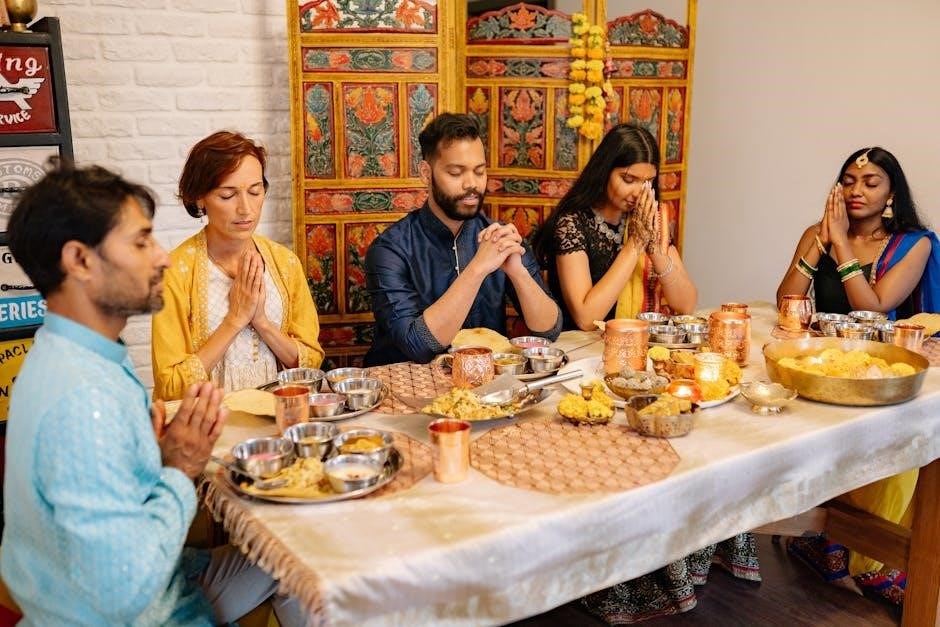
Sai Baba of Shirdi’s teachings emphasized love‚ compassion‚ and self-surrender. His philosophy transcended religious boundaries‚ advocating for a universal path to spiritual growth. His guidance continues to inspire millions in seeking inner peace and divine connection in daily life.
Contemporary Spiritual Leaders and Their Influence
Modern spiritual leaders like Swami Vivekananda and Paramahansa Yogananda have redefined Indian spirituality for the contemporary world. Their teachings emphasize self-realization and practical wisdom‚ creating a bridge between ancient traditions and modern life. Their influence extends globally‚ inspiring seekers to embrace mindfulness and ethical living‚ making Indian spirituality a vibrant force in today’s diverse cultural landscape.
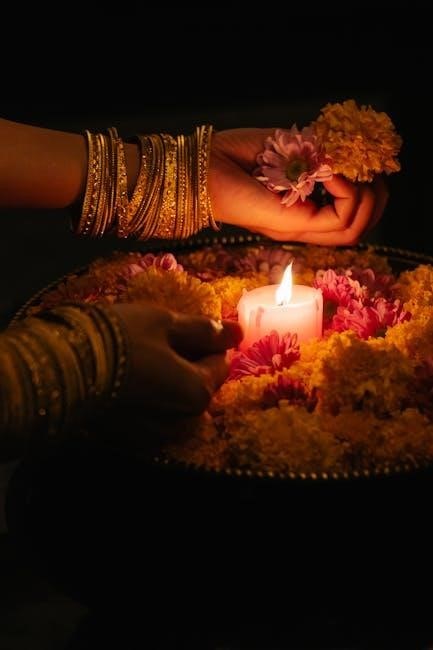
Psychological and Cultural Aspects
Indian spirituality intertwines psychology and culture‚ offering insights into mental well-being and societal harmony. It explores tribal religions‚ cultural integration‚ and the pursuit of inner peace in a chaotic world.
Psychology of Indian Spirituality
Indian spirituality delves into the human psyche‚ offering profound insights into mental and emotional well-being. It emphasizes self-awareness‚ mindfulness‚ and the integration of the mind‚ body‚ and soul. Ancient texts like the Upanishads and the Bhagavad Gita provide psychological frameworks for understanding human behavior‚ emotions‚ and thought processes. Techniques such as meditation and yoga are central to this tradition‚ aims to cultivate inner peace and resilience. The concept of “dharma” (righteous living) and “karma” (action) further shapes psychological well-being by fostering a sense of purpose and ethical living. Indian spirituality also explores the nature of consciousness‚ encouraging individuals to transcend superficial desires and connect with their true selves. This holistic approach to psychology has gained global recognition for its timeless relevance in addressing modern mental health challenges.
Cultural Integration and Tribal Religions
Indian spirituality is deeply intertwined with its rich cultural diversity‚ including the traditions of tribal religions. These indigenous practices‚ often centered around nature worship and communal rituals‚ have seamlessly integrated with mainstream spiritual traditions. The PDF highlights how tribal religions emphasize harmony with the environment and community‚ reflecting a universal quest for meaning. This cultural integration has enriched Indian spirituality‚ fostering a pluralistic society where diverse beliefs coexist. Tribal traditions‚ such as ancestor worship and natural symbolism‚ are not seen as separate but as integral to the broader spiritual landscape. This blending of cultures underscores India’s historical ability to embrace and honor its multifaceted heritage‚ creating a vibrant tapestry of spiritual expression that continues to inspire and unify people across regions and backgrounds.
Inner Peace and Purpose in Modern Life

In today’s fast-paced world‚ achieving inner peace and purpose is a universal quest. The PDF “A Glimpse of Indian Spirituality” offers timeless wisdom to address modern anxieties. By embracing practices like meditation and mindfulness‚ individuals can cultivate emotional balance and clarity. Ancient Indian teachings emphasize the importance of aligning actions with ethical values‚ fostering a sense of purpose. The document highlights how integrating spiritual principles into daily life can lead to a harmonious existence. It encourages self-reflection and introspection‚ guiding readers to reconnect with their inner selves. This approach not only helps in navigating life’s challenges but also in finding fulfillment amidst chaos. The PDF serves as a valuable guide for those seeking to restore balance and discover meaning in their lives‚ offering practical tools rooted in India’s spiritual heritage.
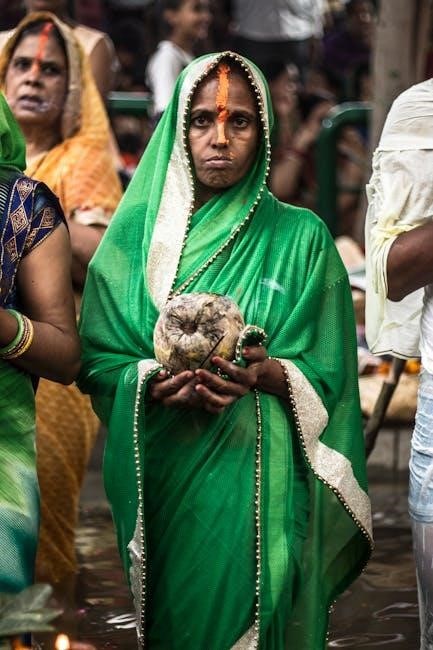
Practical Applications of Indian Spirituality
The PDF highlights practical applications of Indian spirituality‚ emphasizing meditation‚ mindfulness‚ and ethical living. These teachings offer tools for achieving inner peace and purpose in everyday life.
Meditation and Mindfulness Practices
Meditation and mindfulness are cornerstone practices in Indian spirituality‚ offering a pathway to inner peace and self-realization. These techniques‚ deeply rooted in ancient traditions‚ emphasize focus‚ breath awareness‚ and mental clarity. The PDF document highlights how meditation cultivates emotional balance‚ reducing stress and fostering a deeper connection to one’s inner self. Mindfulness practices encourage living in the present moment‚ aligning with the teachings of spiritual leaders like Swami Vivekananda and Sai Baba of Shirdi. Regular meditation is shown to enhance mental well-being and spiritual growth‚ making it a vital tool in modern life. By integrating these practices‚ individuals can achieve harmony and purpose‚ bridging the gap between ancient wisdom and contemporary living.
Ethical Living and Karma Yoga
Ethical living and Karma Yoga are central to Indian spirituality‚ emphasizing selfless action and moral integrity. Karma Yoga‚ rooted in the Bhagavad Gita‚ teaches performing duties without attachment to outcomes‚ fostering a sense of responsibility and service. The PDF document highlights how ethical living aligns with spiritual growth‚ promoting harmony in personal and societal realms. By embracing selflessness and compassion‚ individuals cultivate inner peace and contribute to the greater good. These principles are timeless‚ offering guidance for modern life by encouraging mindfulness and purpose in daily actions. The teachings underscore the transformative power of ethical living‚ bridging spirituality with practical‚ everyday conduct.
Spiritual Practices for Daily Life
Spiritual Practices for Daily Life
The PDF document “A Glimpse of Indian Spirituality” explores practical spiritual practices for daily life‚ offering tools to cultivate inner peace and harmony. Meditation‚ mindfulness‚ and prayer are highlighted as essential practices that help individuals connect with their inner selves and transcend worldly distractions. The text emphasizes the importance of gratitude‚ self-reflection‚ and compassion in fostering a balanced and meaningful life. These practices‚ rooted in ancient Indian wisdom‚ are presented in a way that resonates with modern lifestyles‚ making spirituality accessible to everyone; By incorporating these rituals into daily routines‚ individuals can navigate life’s challenges with grace and equanimity‚ aligning their actions with higher purposes and values. The document underscores how these practices not only enrich personal growth but also contribute to a more compassionate and harmonious society.
The PDF “A Glimpse of Indian Spirituality” beautifully encapsulates the timeless wisdom of India’s spiritual traditions‚ offering insights into achieving inner peace and fulfillment in a modern world.

Relevance of Indian Spirituality Today
Indian spirituality remains profoundly relevant in today’s fast-paced world‚ offering timeless wisdom to address modern anxieties and foster inner peace. The teachings emphasize mindfulness‚ ethical living‚ and self-realization‚ resonating with global seekers of meaning. By integrating principles like karma yoga and meditation‚ individuals can navigate life’s challenges with balance. The PDF highlights how ancient traditions‚ influenced by figures like Swami Vivekananda and Osho‚ continue to inspire contemporary spiritual practices. Their teachings transcend cultural boundaries‚ appealing to a diverse audience. As the world grapples with stress and disconnection‚ Indian spirituality provides a holistic framework for personal growth and harmony‚ making it a vital resource for modern life.